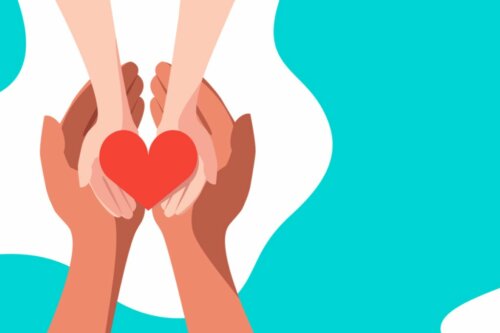Emotional generosity is capable of changing the world. It’s the genuine and selfless will to provide support, well-being, positivity, closeness, and hope. As a matter of fact, today, being generous is an almost revolutionary act.
Nevertheless, it isn’t always easy to carry out this kind of behavior. While it’s true that we all know its benefits and we praise generosity as one of the most commendable virtues, carrying it out requires effort. Furthermore, we’ve become accustomed to reinforcing the idea that, if we do something for someone, they must return the favor at some point.
The most curious thing of all is that generosity has been decisive in our evolutionary history. Indeed, being emotionally available positively affects the well-being of the community, and this is something that we should be more aware of.
“He does not give in order to receive; giving is in itself exquisite joy.”
-Erich Fromm-
Emotional generosity
Emotional generosity is an act of social proactivity with which you can improve the reality of another person through your own emotions. After all, if someone is worried they don’t want to hear phrases like “You’re just exaggerating”, “You worry about anything and everything” or “If you’d done what I suggested it wouldn’t have happened to you”.
Behavior that combines the behavioral and the emotional is the most powerful pillar for building happy relationships. Indeed, in a world where many people often feel alone and misunderstood, emotional generosity is a guarantee of presence, trust, and connection. These three elements are essential for healing.
According to a study from the University of Lübeck (Germany) published in the journal, Nature, being generous also affects us because it makes us happier.
Emotional generosity requires commitment, will, and disregarding the idea of only doing something for someone if they do something for you.
Ways in which emotionally generous people act
Emotional generosity is inbuilt. However, as you mature, by allowing yourself to be wrapped up in your own issues with your particular obligations and goals, you tend to neglect this aspect of yourself.
Research conducted by Stanford University, claims that altruistic and prosocial behavior appears instinctively in four-year-old children. Therefore, it should be promoted, strengthened, and maintained.
Let’s analyze below what emotionally generous people are like. Those, in fact, who you should try and imitate.
Honest communication
Honest communication neither judges nor infantilizes. It’s a type of communication in which no one is ever blamed for what happens to them. Nor does it make empty promises, like telling someone that everything is going to be fine, that what they fear is going to turn out great, or that life will give them everything they want.
Emotional generosity shines through when a person is able to offer support and closeness in an honest way. It means knowing how to be there to offer others what they need at all times.
Emotional availability
We all know people who are defined by a clear emotional coldness. They’re the kinds of figures that aren’t available. They’re like brick walls you come up against. They neither see you nor even want to see you.
These types of relationships hurt and reinforce feelings of loneliness. On the other hand, emotional generosity involves a constant openness. These people are like a daily refuge you can always turn to.
Making the Difficult Easy
They’re calm in a chaotic world. They see a thousand solutions to a single problem. They look at things with hope and not catastrophism. In fact, emotional generosity facilitates coexistence because it conveys serenity, optimism, resilience, and humility.
In a world of excessive haste, many pressures, and little time, personalities endowed with emotional generosity who are capable of leaving everything for a moment just to be with us, are more valuable than ever.

They don’t expect anything in return
The cornerstone of emotional generosity integrates the principle of expecting nothing in return other than the mere pleasure of doing good. That’s the real reward for these kinds of people, knowing that what they’ve carried out improves someone’s life and, consequently, their own.
Far from exploiting altruism, kindness, or respect for the other by expecting benefit for it, being generous makes them free. In fact, generosity frees them from resentment as they don’t expect anything in return. It makes them more worthy and happy beings by bringing well-being to a world that expects the best from each individual.
The post Emotional Generosity: The Sharing of Emotions to Help Others appeared first on Exploring your mind.



















Comments